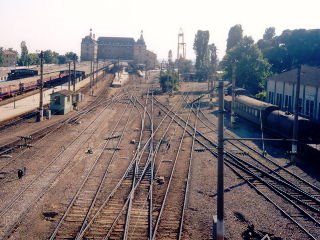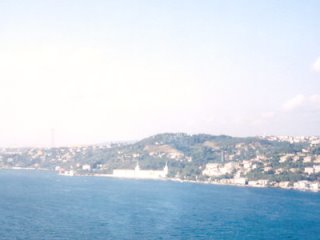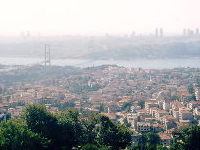
Last update 27 October 2005
Full text of paper here
 |
 |
 |
MigrationThe collapse of the Ottoman empire at the end of the First World War was accompanied by both voluntary and forced migrations. The post-WWI Greek-Turkish war of 1919-22 led to major population exchanges between the two countries accompanies by violence. The connection between Western reaction to these events and access to the oil in what was to become Iraq has been noted by Marjorie Housepian Dobkin in her book Smyrna 1922: The Destruction of a City, NewMark Press, 1998. The history of Cyprus involves Greek, Roman, Byzantine, Frankish, Templar, Venetian and Ottoman rule. Cyprus came under British administration in 1878 and the island was annexed as a British colony in 1914 on the entry of the Ottoman Empire to the First World War until independence in 1960. Unusually a condition of independence was the creation of three sovereign British military bases administered by the Ministry of Defence, an indication of the continued strategic location of Cyprus with respect to both the Middle East and the former Soviet Union. |
Full text of paper here
IdentityThe Greek War of Independence against the Ottoman Empire attracted the attention of the Romantic Movement, exemplified by the figure of Byron, and established a wider understanding of modern nationalism which impacted on the immediate region during the remainder of the nineteenth century. The development of the modern Greek state is a crucial component of Cypriot identity, along with that of the modern Turkish state. Ataturk led the project of the creation of a modern secular Turkish state, including language reform (see Part II of Design and Determination) Despite lengthy negotiations over membership, Turkey has become part of the EU free-trade zone, but not a member in respect of social programmes and developments. Cyprus is now further divided by the Greek-Cypriot community's rejection of reunification and entry of both parts of the divided island into the EU. In 2002, the Civil Society Development Programme, supported by European Commission, started with objective of consolidating reconciliation efforts between Turkey and Greece. One component of this programme, the Turkish-Greek Civic Dialogue project seeks to increase local awareness of the architectural heritage left from the exchange of populations between Turkey and Greece. |
Full text of paper here
Information TechnologyThe contestation and debate over the future of Cyprus and Greek-Turkish relations has moved from physical to cyber-space: http://www.kibris.gen.tr/english/ http://www.trncpresidency.org/ http://kypros.org/Occupied_Cyprus/ Discourse within and between elements of divided community takes place on-line, from within and outside the contested territory, some sponsoring reconciliation: "We seek to unite with Turkish -Cypriots and people from Turkey who, like us, aim for the re-uniting of all of Humanity's peoples, aim for the destruction of all borders and the disarming of the armies guarding them, and for the final overthrow of the governments arming and training them for that purpose. We aim for the overthrow of the system of profits and authoritarian power, and for its replacement by the simple functions of ecological Direct Democracy: a system of self-administration and self-government within all of our communities, which are to be run by voluntary Peoples' Councils at all levels, in the schools, the workplace, the neighbourhoods, the villages and towns. We believe that once the influence of the system of profits and of authoritarian power is removed from both our external and internal (psychological) world, people everywhere are capable of living as equals who can respect and honour each other, and who are capable and willing to make together the major and minor decisions which affect our everyday lives as neighbours, co-workers, colleagues, friends, lovers, comrades." http://www.burleehost.net/cyprus/The_Short_Statement.htm#Short
Away from the contested territory Green Lanes in North London provides a potential site for reconciliation. |
Full text of paper here
|
This page contributed by Melih Kirlidog and Steve Little |
 |
Back to homepage for Migration, Identity and New Information Technology workshop